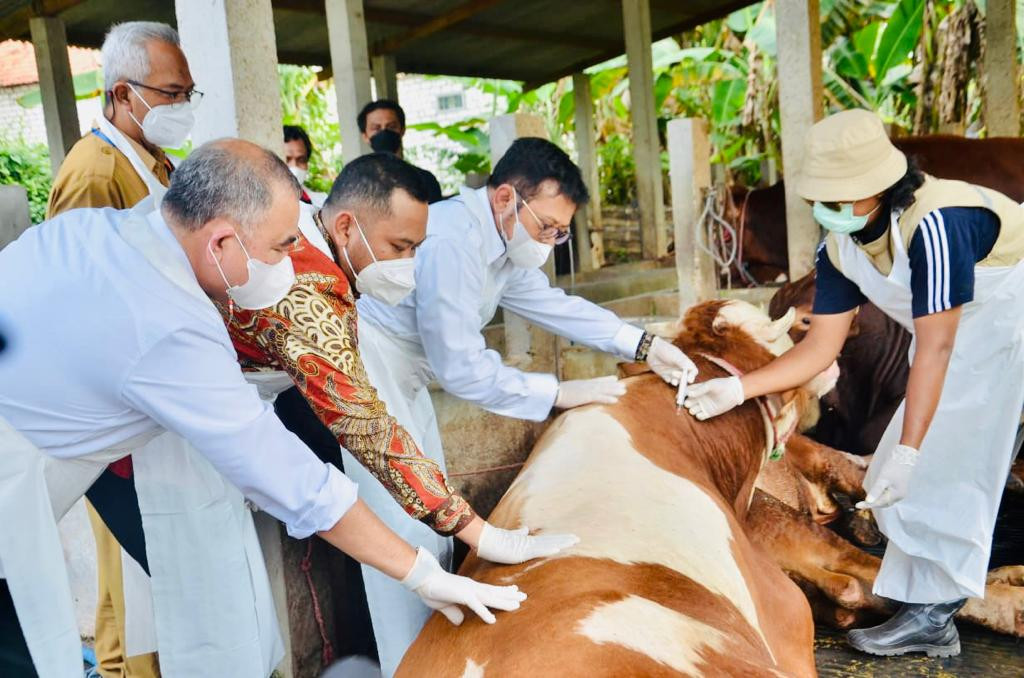Farmers fear FMD threat on meat output as Day of Sacrifice draws near
Foot-and-mouth disease has infected thousands of cattle in several provinces of Indonesia and could increase demand for imported beef.
Change text size
Gift Premium Articles
to Anyone

Indonesian cattle farmers are worried about the threat to their business amid the recent outbreaks of foot-and-mouth (FMD) disease.
The Indonesian Cattle and Buffalo Breeders Association (PPSKI) told The Jakarta Post on Thursday that farmers stood to lose Rp 10 million (US$682) for each animal put down after infection with the virus.
PPSKI chairman Nanang Purus also estimated the damage due to cattle weight loss caused by the disease at Rp 2 million per head.
“We’re concerned, because East Java is a cattle barn center. There is a huge potential of unreported additional cases, because the virus may have spread to other regions during the Idul Fitri holidays,” he told the Post on Thursday, adding that the calculation of the overall losses suffered in affected areas had yet to be determined.
After being free from FMD for three decades, the recent outbreaks mean Indonesia now faces the risk of a spread as Idul Adha, the Islamic Day of Sacrifice, draws closer.
Cattle breeders have seen a drop in demand and are bracing for losses during what should be their most profitable season.
The virus, which has infected thousands of heads of cattle, has been identified as stereotype O of IND2001, a strain that is common in the Southeast Asian region, Agriculture Minister Syahrul Yasin Limpo said in a virtual briefing on Wednesday.
In order to contain the spread of the highly contagious disease, President Joko “Jokowi” Widodo assigned the agriculture minister to delineate lockdown zones “to prevent the movement of livestock from one place to another, or from one regency to another, let alone from one province to another,” the President said on Monday.
Read also: Economic potential of Idul Adha dampened this year due to COVID-19: Minister
The virus has a high morbidity and low mortality rate, at 100 percent and below 5 percent, respectively, according to veterinarian Dwi Cipto Budinuryanto.
Thirty-three animals have died among the 2,000 infected, Syahrul said on Wednesday. According to a circular from the ministry sent to the animal quarantine units across the country, no exit certificates are to be issued for livestock in infected areas, whether they be cattle, goats, buffalo or other potential carriers. This also applies to their meat, skin and dairy products.
Proper measures to control the spread of the virus are critical for the farming industry, Dwi added, because it would cause declining livestock productivity and decreasing sales of derivative products.
FMD was first reported on April 28 in Gresik, East Java, with 402 cases affecting 22 villages across five districts. Only a few days later, new cases were found in other regencies across East Java, namely in Lamongan, Mojokerto and Sidoarjo.Recently, the disease has also been found in other provinces, including Central Java, and Aceh on Sumatra Island, and is suspected to have reached West Nusa Tenggara.
Local vaccines are currently in production and should be ready within 20 days, said Syahrul. In the meantime, the government will use imported vaccines on infected livestock, he said, without providing details on the shots.
“The type of the imported FMD vaccine must be compatible with the strain found in the field,” Dwi told the Post on Thursday.
The outbreak, which hit during Idul Fitri, could boost Indonesia’s imports of beef, which the government forecast will reach 193,223 tons this year.
Domestic beef production in the country with the world’s largest Muslim population only covers about 70 percent of annual consumption. The rest is imported from countries including Australia, New Zealand, India and the US.
Read also: Indonesia halts beef imports amid India's 'second coronavirus wave'
Rising meat imports
Indonesian Farmers Union (SPI) chairman Henry Saragih speculated that an increase in meat imports from countries with active FMD zones was behind the spread.
“The government needs to protect domestic livestock and aim for Indonesia to be self-sufficient in meat production,” Henry said in a statement on Thursday.
Indonesia saw its beef imports rise to 273,530 tons in 2021, up 22.4 percent from 223,420 tons in the previous year, Statistics Indonesia data show.
The value of beef imports also increased last year, rising by 35.83 percent to $948.37 million.









